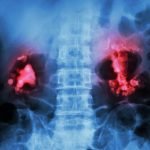Naturopathic Disaster Medicine
JEN RIEGLE, ND
In 2017, my life was changed by a series of events that eventually led to the birth of a non-profit called Integrative Healers Action Network. After finishing medical school in 2016, I had just moved to Northern California and was settling into my new home and building a practice. When I woke up one October 2017 morning and our county was on fire, my initial response was panic. I had lost everything in a house fire when I was 12, and it took less than seconds for my nervous system to get into a full fight-or-flight state. After talking things through with my husband, family, friends, and loved ones, as well as physically preparing our home, we decided we wanted to do something to help. With a handful of other practitioners, including my now-non-profit-partner Jenny and husband Chris, we walked into the main Red Cross shelter that was housing more than 500 individuals and acting as a base camp for thousands of firefighters, and we requested permission to set up an integrative healthcare clinic. The disaster response work that first year was a whirlwind. We worked around the clock and set up 15 different clinics coordinating thousands of practitioners to volunteer their time and skills to those in need. Since then, we have formed a non-profit, formed a partnership with the American Red Cross, and grown into an established organization of vetted, trained professionals.
I can’t tell you how much I have learned from doing disaster response and recovery work over the last 4 years. It has informed my work, not only in acute disaster, but also in private practice. This work necessitates that I dive deep into learning about the nervous system’s response to acute danger, how that manifests in the body, mind, and spirit, and how to work with it. It also requires that I go deeper into my own spiritual and emotional work so that I can remain grounded, calm, and stable while being present for those who have lost everything.
Uniquely Suited to the Task
Naturopathic doctors are uniquely positioned to provide care in acute disasters. We have the training required to triage, write interim prescriptions for those who left medications at home while evacuating, and provide medical care. Importantly, we also have the skills required to treat acute and chronic pain, insomnia, anxiety, trauma, and other complaints common in disaster. Before I went to that first shelter in 2017, I had no idea what to expect. Would there be people bloodied and injured everywhere? Hysterically crying after losing a loved one, home, or animals? Each time I respond to disaster, there is something new to learn and different experiences to be had. However, I do find it helpful to have a general idea of what one will encounter at a natural disaster shelter.
When you arrive at a shelter, you quickly realize that everyone there is impacted – not just those who evacuated, not just those who have lost a home or a family member, but everyone, including you. Adjustments in flexibility, increased groundedness, and compassion are required when plans change, someone’s word cannot be kept, or people are unkind or confrontational in a moment of overwhelm. It makes sense now how my original dramatized idea of a bloody injured mess would be incorrect. Most people entering shelters have had time to evacuate and have escaped acute physical injury. What we do tend to see are major impacts to emotional and mental health, acute trauma responses, and often exacerbations of health complaints, sometimes severe. For example, worsening asthma or asthma attacks, as you might expect, are very common in disaster. Chronic pain increases for most, and an onset or exacerbation of insomnia is often experienced by those who are sleeping three feet away from the next person in a room of 500, guarding all of their most precious belongings. Stress and anxiety increases for those trying to navigate the mountain of paperwork in front of them. Often, evacuees do not know for several days whether their homes are destroyed or standing, whether their family or pets are safe, or when they will be allowed to return home. Emotions are high pretty much all of the time.
As naturopathic doctors, we often treat: pain using physical medicines and supplements, lung health using N-acetylcysteine, herbs, and nebulized glutathione (especially in first responders); insomnia using biofeedback, homeopathy, and herbs; viral illnesses using supplements and hydrotherapy; and trauma using counseling, biofeedback, and somatic practices. Many other complaints arise, and I find our training makes us well equipped to handle them. One of the most inspiring facets of our medicine to me is its adaptability. We have so many tools, and naturopathic medicine can be taken anywhere with some minor adjustments.
As we continue to offer increasing levels of training and we work to provide ease to practitioners who are volunteering their time for disaster response in California, we are also looking at expanding to other states at some point in the future. Each time we set up a volunteer clinic, our communication with those in charge of a shelter, armory, base camp, clinic, or sheriff’s department requires an incredible amount of confidence, compassion, flexibility, and understanding. When first arriving at a new location, we go directly to those in charge and explain the free services we have to offer to their clients or employees. Though our community partnership with the American Red Cross now creates relative ease in establishing a clinic inside of a shelter, we know it is possible to establish new relationships each time we enter a space. Our recognition that the services we provide are incredibly valuable is a helpful bridge in creating relationships. Those in charge are assured that we all are trained, licensed, insured, and vetted, and that we will remain flexible if they need us to move, change how we practice, change hours, or make other adjustments. It is helpful to remember that the people in charge are often overwhelmed and truly want to do what is best for their clients or employees; and we may initially be perceived as another obstacle and one more thing to have to manage. That said, they often very quickly realize what an asset it is to have integrative health and wellness services offered inside their space. One shelter manager brought in from the South midway through a California fire response in 2017 told us that he never would have let us set up if we hadn’t already been there. However, in the same breath, he told us that the number-1 comment of evacuees when they left the shelter was how they felt so cared for because of our services. Additionally, he noted that his shelter was a much calmer and friendlier environment because of integrative health services. He then welcomed us at any other space where he was managing.
Gratifying Work
I could share countless stories of first responders and evacuees being positively impacted by integrative health and medicine services. From firefighters being able to take a full deep breath again for the first time in months, to evacuees who were able to sleep for the first time in weeks and could thus begin to take important steps toward moving forward – these stories are what makes it all worth it. Disaster work is grueling work on most days. It requires extreme flexibility, impeccable boundaries, skill, and, above all, compassion. However, it is profoundly satisfying when someone tells you that this changed their life, or changed their outlook and capacity to move forward, or simply that they were able to take a shower for the first time in weeks, as one woman treated in our 2018 Camp Fire clinics told one of our homeopaths. It’s inspiring work, work that I know many of you have a deep calling to participate in, just as I do.

Jen Riegle, ND, is a licensed naturopathic doctor with a degree from Bastyr University. She owns and operates Wild Oak Medicine in Santa Rosa, CA, where she practices naturopathic medicine. Her areas of clinical focus are environmental medicine, trauma-informed care practices, fertility, women’s health, and autoimmunity. Dr Riegle is the co-founder and medical director of Integrative Healers Action Network. As IHAN continues to grow, Dr Riegle enjoys continuing to learn and teach about trauma-informed disaster care with integrative modalities. Facebook handle: @IntegrativeHealersActionNetwork









